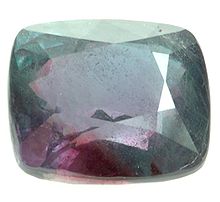Editing Internet Texts/Gemstones/Alexandrite
Appearance
Alexandrite
[edit | edit source]Alexandrite is one of the rarest and most valuable gemstones. It was discovered by chance during a search for emeralds near Yekaterinburg in 1833, on the day of Alexander the Second's birthday anniversary (hence the name).[1] It is a very valuable variety of chrysoberyl, which ranks as the third-hardest gemstone, right after diamond and corundum.
Alexandrite changes its color depending upon the nature of ambient lighting. It is emerald-colored or grass-green in daylight and purple-reddish in artifical light. Its color varies also from red to orange-yellowish depending on the angle from which it is looked at.

Basic properties
[edit | edit source]| Composition | Al2BeO4 |
| Class | Oxydes and hydroxydes |
| Crystal system | Rhombic |
| Mohs' hardness | 8,5 |
| Fracture | Conchoidal |
| Cleavage | Imperfect |
| Lustre | Glassy |
| Streak | White |
| Localities | Tanzania, Brazil, Sri Lanka, Republic of South Africa, India, Zimbabwe, Tasmania |
References
[edit | edit source]- ↑ Minerały i kamienie szlachetne by RBA Collecionables, S.A., ISBN 978-83-7813-150-2, 2012.
